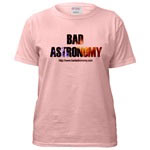
| Bad Astronomy |
|
|
|
BA Blog
|
|
Q & BA
|
|
Bulletin Board
|
| Media |
|
|
|
Bitesize Astronomy
|
|
Bad Astro Store
|
|
Mad Science
|
|
Fun Stuff
|
| Site Info |
|
|
|
Links
|
| RELATED SITES |
| - Universe Today |
| - APOD |
| - The Nine Planets |
| - Mystery Investigators |
| - Slacker Astronomy |
| - Skepticality |
Buy My Stuff

Keep Bad Astronomy close to your heart, and help make me
filthy rich. Hey, it's either this or one of those really
irritating PayPal donation buttons here.
Redfaced Shift
August 18, 1999Something about black hole reports seems to bring out funny little errors. This one isn't so bad, but my philosophy is what the heck, if I can use it to bring about a bit of Good Astronomy...
On the CNN website is an article about a black hole chomping down matter around it. In it is the following:
Just as stretched and compressed sound waves cause the sound of a train's whistle or a truck's horn to rise and fall as they pass an observer, light is stretched, or red-shifted, as it speeds away from the Earth.
Actually, light is neither stretched nor compressed as it moves away from or toward the observer. That happens if the object emitting the light is headed away from or towards the observer. A subtle but important point: we only see this shift for objects that are moving, and not for any old beam of light we see. That's how astronomers can tell how quickly an object is moving! You can read more about this on my web page about the Doppler Effect (as an aside, I'll note that you can also get a redshift as the light from near the black hole fights its way out of the strong gravity near the hole; the light loses energy moving ``uphill''. However, this is only significant for light coming from very near the black hole itself).
It's possible that the writer might have originally said ``...light is stretched, or red-shifted, as the object emitting it speeds away from the Earth.'' and an editor somewhere changed it. From the phrasing it seems unlikely though. The original article is from the Reuters News source, and may have originated there and not with CNN as well.
By the way, there's another subtle error: they say ``stretched and compressed'' then ``rise and fall'': actually, stretching makes the sound drop in pitch, and compressing makes it rise. I think that's a simple typo; they got the phrasing backwards.
My thanks to Bad Reader Gary Schwartz for alerting me to this one.
|
|
|
|